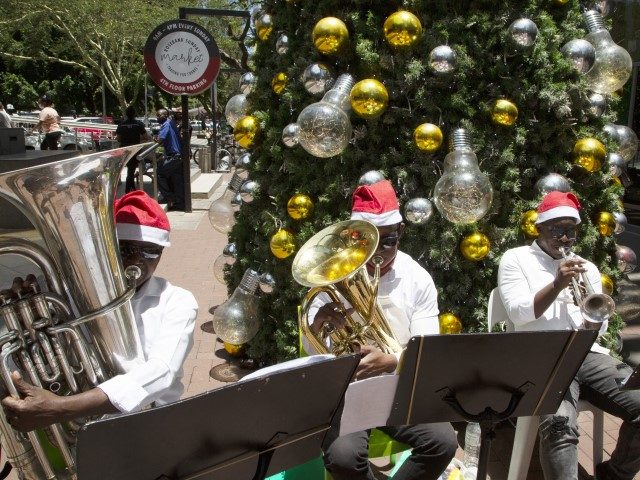Thousands of South Africans celebrated Christmas in Johannesburg and Cape Town this week — visiting seasonal light displays, shopping, and frequenting bars and nightclubs — Reuters reported on Friday, noting the festivities took place in spite of South Africa’s recent caseload surge of omicron, the new Chinese coronavirus variant.
“In Johannesburg, thousands … have turned out to enjoy the light displays that have filled the upmarket Melrose Arch shopping precinct with flashing reindeer, glittering giant teddy bears and glowing Christmas trees,” the news agency detailed on December 24.
“Everyone’s out here partying,” tourist Jason Smuts told Reuters on the evening of December 24. He described a scene on Cape Town’s Long Street in which “masked police keep the traffic flowing through the packed streets.”
“It’s Christmas, we have to be merry you know,” a Long Street reveler named Caden Khayo told Reuters on the night of December 24. Khayo spoke to the news agency while standing outside a bar on the busy street “as drinkers move[d] from club to club around him.”
A bar owner on Long Street named Prince Kabare told Reuters on Friday lunch traffic at his establishment has improved “30 to 40 percent” since this time last year when most of South Africa was locked down due to the pandemic.
“[W]e’re able to get some of the staff back and get moving,” Kabare said of his improved business prospects.
The discovery of omicron in southern Africa in mid-November — in Botswana on November 11 and in South Africa on November 14 — prompted speculation the region might suffer from intense lockdowns this winter holiday season, as it did in 2020.
South African President Cyril Ramaphosa “has stopped short of ordering any new curbs this time around. He has urged people to be careful and has let bars keep the beer flowing, for now,” Reuters observed on Friday.
Ramaphosa tested positive for an undisclosed strain of the Chinese coronavirus on December 12 despite being fully vaccinated against the disease. The president’s office said Ramaphosa completed a self-isolation period on December 20 and was back to work the same day after suffering only “mild symptoms.”
South Africa’s decision not to lock down the country ahead of the winter holiday season likely stems from recent studies out of the country indicating omicron causes less severe illness than previous strains of the Chinese coronavirus.
“New Covid-19 [Chinese coronavirus] data out of South Africa, which has been ravaged by the Omicron variant in recent weeks, suggests the current surge has resulted in far fewer deaths than previous surges with similar case numbers,” Business Insider South Africa reported on December 24.
#Omicron epidemic in hard hit #Gauteng province in South Africa is rapidly abating with thankfully much less relative impact in terms of daily hospitalizations and deaths than past Covid waves. ICU admissions down ~80% on relative basis; hospital stays were generally less acute. pic.twitter.com/O4fduSkKLz
— Scott Gottlieb, MD (@ScottGottliebMD) December 23, 2021
Business Insider South Africa cited newly released graphs created by the American Enterprise Institute (AEI) that used “data from South Africa’s National Institute for Communicable Diseases and Our World in Data [to] compare the current Omicron surge to three previous peaks in the country in July 2020, January 2021, and July 2021.”
“In the Gauteng province of South Africa, an area that was hit particularly hard by Omicron, the number of daily hospitalisations and deaths in the past month has been substantially fewer than previous Covid-19 peaks in the area throughout the pandemic,” the news site relayed after reviewing the AEI graphs.
The number of coronavirus patients admitted to Intensive Care Units (ICUs) in Gauteng “are down about 80 percent on a relative basis” according to the news site, “while those who are being hospitalised for the virus are having more acute stays.”
One AEI graph released on December 23 showed “drastically fewer deaths attributed to the current Omicron epidemic when compared to three previous peaks [of coronavirus] in the country.”
South Africa’s government announced on December 23 it would immediately end all contact tracing and quarantine efforts for close contacts of omicron-positive patients. The country’s Department of Health issued a press release explaining its decision to halt the measures, saying there has been “a high number of asymptomatic cases” of omicron in South Africa and “only a small proportion of infections were diagnosed through lab testing.”

COMMENTS
Please let us know if you're having issues with commenting.